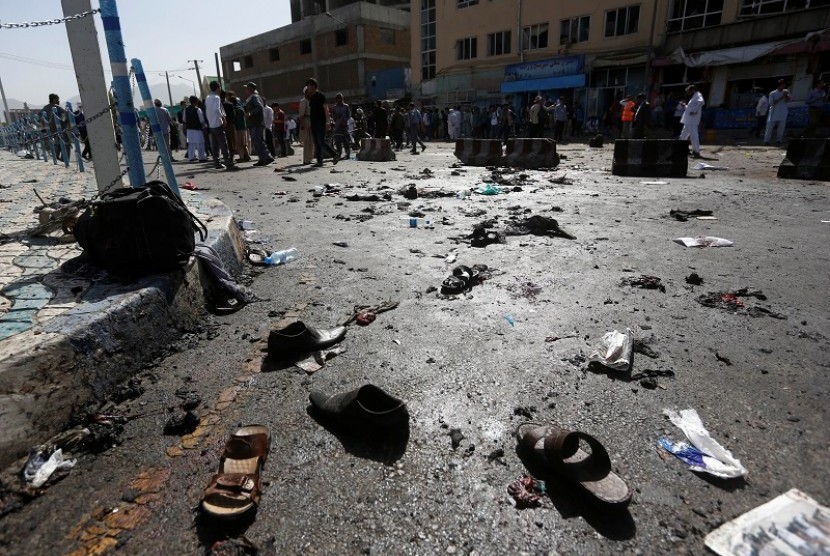REPUBLIKA.CO.ID, KABUL -- The Taliban warned the Afghan government on Thursday against harming any of their prisoners after reports that President Ashraf Ghani would order the execution of 11 militants on death row in revenge for the devastating truck bomb attack in Kabul.
Ghani's fragile and divided government has come under increasing pressure over its failure to provide security following a series of high-profile attacks that have killed hundreds of soldiers and civilians so far this year.
Wednesday's blast, at the start of the Muslim holy month of Ramadan, ripped through a traffic-clogged street, packed with people on their way to school or work during the morning rush hour, causing hundreds of casualties in an instant and sending a tower of black smoke into the sky.
One of the worst such attacks since the U.S.-led campaign to oust the Taliban in 2001, it was only the latest in a grim series that has killed thousands of civilians over the years.
Salim Rasouli, head of hospitals in Kabul, said 80 dead and 461 wounded had been brought to the city's hospitals but at least 10 other people were known to be missing and believed dead, with relatives still searching morgues and hospitals more than 24 hours after the blast.
"For God's sake, what is happening to this country?," said Ghulam Sakhi, a shoemaker whose shop is close to the site of the blast. "People leave home to fetch a loaf of bread for their children and later that evening, their dead body is sent back to the family."
The Taliban have denied responsibility. But the National Directorate for Security, Afghanistan's main intelligence agency, has blamed the Haqqani network, an affiliate group directly integrated into the Taliban, and said it had acted with the help of Pakistan's intelligence service.
A spokesman for Pakistan's foreign ministry rejected the allegations as baseless, saying the accusations would be "unhelpful towards efforts for peace".
Also read: Death toll rises to 64 in Kabul car bomb explosion
With growing public anger over the chronic lack of security, Afghan television station Tolo News reported that Ghani had signed execution orders in a repeat of last year's hanging of six Taliban prisoners after an earlier suicide attack.
Two senior Afghan officials confirmed that a list had been drawn up of prisoners, all convicted members of the Taliban or the Haqqani network, but said no order had been signed. In a statement, the Taliban, who repeated their denial of
involvement, responded to the reports by threatening retaliation against the Kabul government and the justice system in particular if any prisoners were harmed.
"The administration of Kabul will be responsible for the outcome of incidents and any kind of losses." the movement's spokesman Zabihullah Mujahid said in a statement.
Security gates
Wednesday's explosion occurred near the German embassy at one of the entry points to Kabul's unofficial Green Zone, a haphazard warren of concrete blast walls and sandbagged check points that has grown up around the diplomatic quarter as the insurgency has intensified.
While the sewage tanker carrying the bomb was stopped from entering the zone, it was unclear how such a large quantity of explosives could get through the ring of checkpoints set up around Kabul to protect the capital.
A high-tech set of security gates and associated scanners, financed by China and intended to protect the capital from large bomb attacks, still lies unused in a warehouse, almost a year after it was delivered.
An official from the interior ministry confirmed that the gates were still in the warehouse and said there were technical problems but installation had already been held up for months over bureaucratic wrangling.
With two dozen entry points into Kabul and thousands of vehicles entering and leaving each day, total control is impossible but there have been increasing questions over how trucks loaded with explosives manage to drive through the city.
A huge crater ripped into the ground at the site of the blast and shattered windows in houses more than a kilometre away were testament to the power of the explosion, which was set off by a bomb concealed in the tanker.
Several embassies were damaged and a number of foreigners wounded, but the majority of victims were, as ever in such attacks, Afghan civilians.
"Right now, thousands of our people are in mourning. Why and for how long do we have to suffer this situation?" said
shopkeeper Enayatullah Mohammadi. "We want our leaders to ensure security in the country and if they can't, they should resign."



